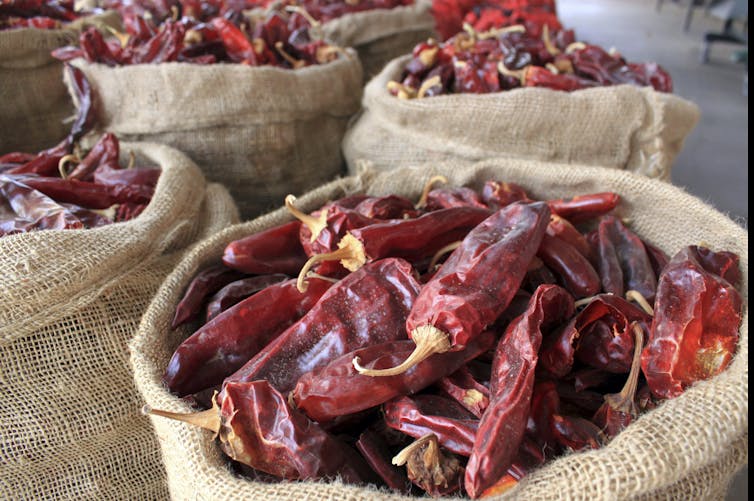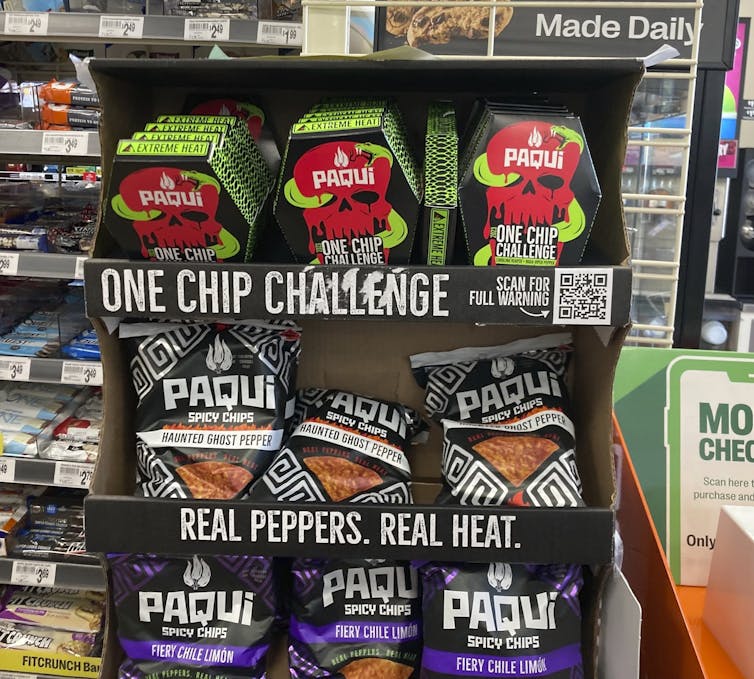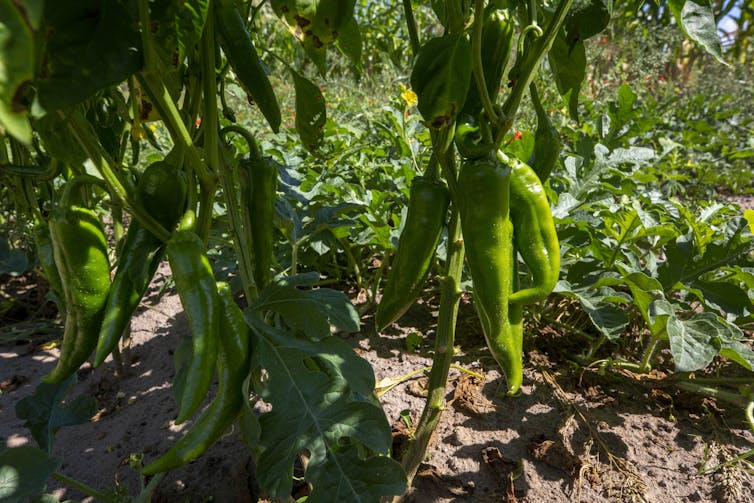
Paul D. Terry, University of Tennessee
Everyone has a different tolerance for spicy food — some love the burn, while others can’t take the heat. But the scientific consensus on whether spicy food can have an effect — positive or negative — on your health is pretty mixed.
In September 2023, a 14-year-old boy died after consuming a spicy pepper as part of the viral “one chip challenge.” The Paqui One Chip Challenge uses Carolina Reaper and Naga Viper peppers, which are among the hottest peppers in the world.
While the boy’s death is still under examination by health officials, it has gotten some of the spicy chips being used in these challenges removed from stores.

As an epidemiologist, I’m interested in how spicy food can affect people’s health and potentially worsen symptoms associated with chronic diseases like inflammatory bowel disease. I am also interested in how diet, including spicy foods, can increase or decrease a person’s lifespan.
The allure of spicy food
Spicy food can refer to food with plenty of flavor from spices, such as Asian curries, Tex-Mex dishes or Hungarian paprikash. It can also refer to foods with noticeable heat from capsaicin, a chemical compound found to varying degrees in hot peppers.
As the capsaicin content of a pepper increases, so does its ranking on the Scoville scale, which quantifies the sensation of being hot.
Capsaicin tastes hot because it activates certain biological pathways in mammals – the same pathways activated by hot temperatures. The pain produced by spicy food can provoke the body to release endorphins and dopamine. This release can prompt a sense of relief or even a degree of euphoria.
In the U.S., the U.K. and elsewhere, more people than ever are consuming spicy foods, including extreme pepper varieties.
Hot-pepper-eating contests and similar “spicy food challenges” aren’t new, although spicy food challenges have gotten hotter – in terms of spice level and popularity on social media.
Short-term health effects
The short-term effects of consuming extremely spicy foods range from a pleasurable sensation of heat to an unpleasant burning sensation across the lips, tongue and mouth. These foods can also cause various forms of digestive tract discomfort, headaches and vomiting.
If spicy foods are uncomfortable to eat, or cause unpleasant symptoms like migraines, abdominal pain and diarrhea, then it’s probably best to avoid those foods. Spicy food may cause these symptoms in people with inflammatory bowel diseases, for example.
Spicy food challenges notwithstanding, for many people across the world, consumption of spicy food is part of a long-term lifestyle influenced by geography and culture.
For example, hot peppers grow in hot climates, which may explain why many cultures in these climates use spicy foods in their cooking. Some research suggests that spicy foods help control foodborne illnesses, which may also explain cultural preferences for spicy foods.

Lack of consensus
Nutritional epidemiologists have been studying the potential risks and benefits of long-term spicy food consumption for many years. Some of the outcomes examined in relation to spicy food consumption include obesity, cardiovascular disease, cancer, Alzheimer’s disease, heartburn and ulcers, psychological health, pain sensitivity and death from any cause – also called all-cause mortality.
These studies report mixed results, with some outcomes like heartburn more strongly linked to spicy food consumption. As can be expected with an evolving science, some experts are more certain about some of these health effects than others.
For example, some experts state with confidence that spicy food does not cause stomach ulcers, whereas the association with stomach cancer isn’t as clear.
When taking heart disease, cancer and all other causes of death in a study population into consideration, does eating spicy food increase or decrease the risk of early death?
Right now, the evidence from large population-based studies suggests that spicy food does not increase the risk of all-cause mortality among a population and may actually decrease the risk.
However, when considering the results of these studies, keep in mind that what people eat is one part of a larger set of lifestyle factors – such as physical activity, relative body weight and consumption of tobacco and alcohol – that also have health consequences.
It’s not easy for researchers to measure diet and lifestyle factors accurately in a population-based study, at least in part because people don’t always remember or report their exposure accurately. It often takes numerous studies conducted over many years to reach a firm conclusion about how a dietary factor affects a certain aspect of health.
Scientists still don’t entirely know why so many people enjoy spicy foods while others do not, although there is plenty of speculation regarding evolutionary, cultural and geographic factors, as well as medical, biological and psychological ones.
One thing experts do know, however, is that humans are one of the only animals that will intentionally eat something spicy enough to cause them pain, all for the sake of pleasure.
Paul D. Terry, Professor of Epidemiology, University of Tennessee
This article is republished from The Conversation under a Creative Commons license. Read the original article.
